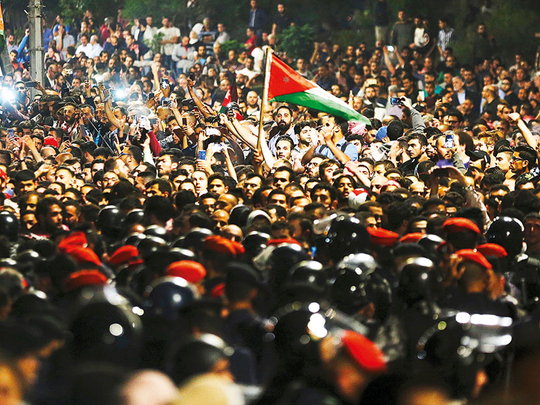
Dubai: “There will be no Arab Spring in Jordan”.
This was a line in a message circulated on social media summarising the situation in the Hashemite kingdom. It came in response to some speculation about the direction the disturbances in the country over the past few days were taking. Demonstrations have rocked the capital Amman and several other cities since Wednesday after the government adopted a draft income tax law and announced new price hikes based on recommendations by the International Monetary Fund.
Other messages on social media read: “The security men are our sons before being members of the security [forces]”; “Our protests are against the government’s policies and not the regime”; and “We are one hand and won’t allow anybody to divide us.”
News of protests in Jordan has dominated headlines in regional and international media in the past few days as Jordanians expressed their frustration with the government economic policies.
“The protests showed a high degree of nationalistic and political consciousness, coupled with unity among all segments of society,” said Mousa Shteiwi, Director of the Strategic Studies Centre at the University of Jordan, highlighting the fact that protesters did not cause any damage to public property and there were no casualties.
“Demonstrations were a result of economic policies and the catalyst was the proposed tax law. This was the straw that broke the camel’s back,” Shteiwi told Gulf News in an interview.
He said that people’s demands were clear. Jordanians called for the government’s resignation and a change in economic policies. Prime Minister Hani Mulki resigned on Monday, while some reports indicated that the proposed tax law could be shelved.
Mulki’s government policies have “impacted the middle and lower classes,” said Khaled Zubeidi, economic expert and managing editor of the Arabic language Al Dustour newspaper. “The protests have been strong but at the same time they were under control and organised,” he told Gulf News.
Mona Hassan, a Jordanian teacher whose house is close to the Professional Union building in Amman, where most of the protests were centered, said citizens behaved in an orderly manner even as they protested. “At the end of the day on Sunday, protesters collected garbage from the site of the demonstrations, including all the banners they were holding, put them in plastic bags, before thanking the security men and having Suhour with them at the site.
“They wanted to show that they were protesting for a certain purpose and not trying to destroy things,” Mona told Gulf News.
Another Jordanian citizen, who asked to be identified by only her first name, Abeer, said she didn’t join the protests for personal reasons, “but from what I have heard, there were no attacks on or insults against the security forces and vice versa. Yesterday, Crown Prince Hussain visited the site near the PM’s office where the protests took place.”
Amman has been listed among the 28 most expensive cities in the world. The GDP per capita in Jordan is estimated at about $5,000 (Dh18.35 billion). In addition, since the beginning of the year, the outgoing government has increased the prices of 170 commodities by up to 10 per cent, raised taxes on hybrid and electric cars, and amended the property law in a way that makes buying property to live in more difficult for ordinary Jordanians, Zubeidi said. And then came the draft tax law.
Today, Jordan’s foreign debt is estimated at $38.5 billion.
The economic hardship was doubled with regional conflicts, wars and terrorism, said political analysts.
“For seven years, we have been plagued by wars in the region,” said Shteiwi.
Syria is one of Jordan’s main trade partners. Iraq was among the major ones too, but Jordan’s border with Iraq was closed for many years before being reopened.
Regional conflicts have led to the influx of refugees into Jordan, a poor country with few natural resources. This has worsened the economic situation with the additional strain on resources and services offered to people.












